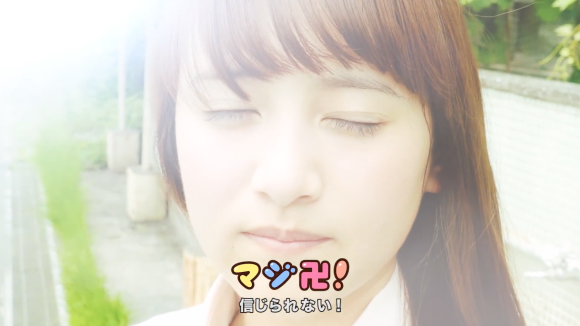
NHK and swastikas don’t mean what you think they do anymore.
When it comes to setting trends in Japan, Japanese schoolgirls have been leading the way for years, creating a boom in demand for mobile messaging and photo sharing apps like Line and Snow, and even inventing their own vocabulary of hip slang words to communicate with while using them.
With the new slang frequently popping up in everyday conversations, if you’re not a Japanese student, chances are you won’t understand half of what’s being said around the schoolyard these days, so freeware app Line is here to give us all a lesson in schoolgirl talk with a brand new video showing a day in the life of a JK (joshi kosei) or Japanese schoolgirl.
Take a look at the video below to see if you can understand what’s being said:
Thankfully for us, Line has included some explanatory subtitles beneath some of the obscure words that appear in the clip to help us decipher what’s going on.
Some of the JK terms used include “Ma?“, which stems from the phrase “Maji de?” which translates to “Seriously?” and “Maji Man“, which adds the abbreviation for “Manji” – the counter clockwise or left-facing swastika symbol (卍) commonly seen at Japanese temples – on the end.
School students use the word “manji” or “man” in a number of different ways: it can be used to describe someone who’s naughty and mischievous, in a sentence like “Ano hito manji da yo ne” (“That guy’s a manji”), or used as an exclamation, when shouted out like “Manji!!!“.
The phrase “Maji Man!” is translated as “Shinjerarenai!” or “I can’t believe it!“, as the “man” exclamation at the end adds extra emphasis to the disbelief inherent in the word “Seriously?”
Not only are kids using the left-facing manji swastika in conversation and in text messages, they’re also using it when posing for photographs, with people positioning their arms and legs to resemble the manji symbol.
The same sense of exclamation and excitement is expressed with the pose, which many believe got its start from the wild movements of Sabotender/Cactuar and Jabotender/Giant Cactaur from the Final Fantasy video game series.
Another slang word used in the clip is “Staren”, which comes from “Stamp Renda”, meaning “Stamp Barrage”, and “Stabaku”, which is an abbreviation of “Stamp Bakuhatsu” or “Stamp Explosion“.
Other notable JK vocabulary in the clip includes:
Ometan = Tanjoubi Omedetou = Happy Birthday
Ri = Ryoukai = Understood/Roger
Ten Age = Tension Agaru = Amp up the tension/Get excited
Amore = I love you
NHK = Ni no ude, Hippate, Kiss = Upper arm, Pull in, Kiss
Imifu = Imi Fumei = ambiguous/cryptic
Wanchan = One chance
According to a survey conducted by Line, more than 80 percent of teenage users understood the expressions “Imifu” and “Wanchan“, closely followed by “Manji” (卍) “Ten Age” and “Staren“, suggesting these are the most commonly used terms amongst high school students.
The video itself introduces a new phrase in its title, “Wanchan Wandoki“, which translates to “One Chance One Fast Beat (of the heart)“, and refers to the way your heart pounds when you receive a “Wankiri” or “One-ring” on the phone from your crush. While the one-ring is usually performed when exchanging numbers for the first time so you can register the new number on your phone, in the clip, the lead schoolgirl experiences “Wanchan Wandoki” when her friends change her profile in a way that prompts her boyfriend to call her.
So next time you want to prove you’re cool at school, don’t forget to wish your friends “Ometan” and create some “Ten Age” with “Staren” text messages. Chances are you might receive an “Imifu” in reponse, though, so if you really want to brush up on the lingo, check out the top 10 buzzwords used by Japanese high school girls in 2016 over here.
Source: Gogotsu via Hachima Kikou
Images: YouTube/LINE Japan

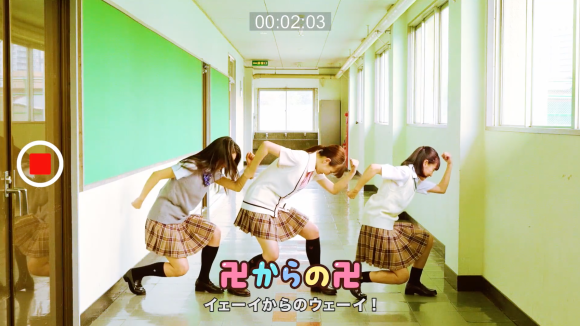
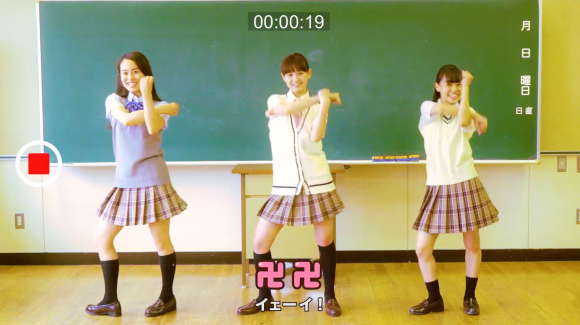
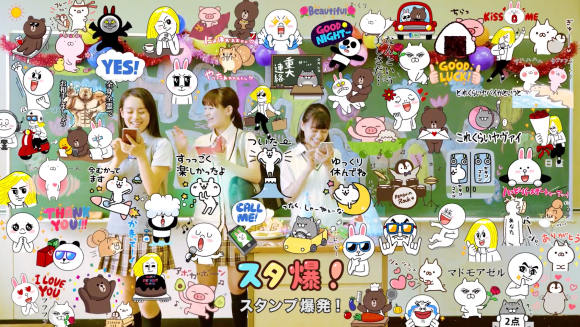
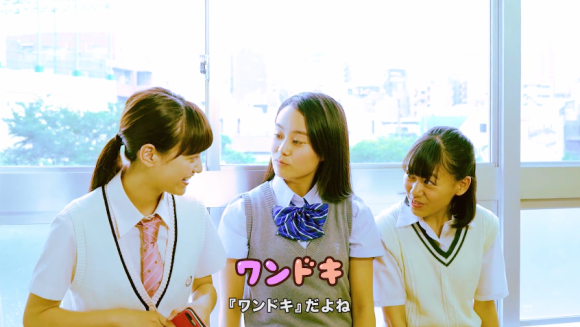
 Boys’ love manga categorized into more than 30 sub-genres at mainstream Tokyo bookstore
Boys’ love manga categorized into more than 30 sub-genres at mainstream Tokyo bookstore Tokyo’s ban on high school girls working in the controversial JK industry goes into effect this summer
Tokyo’s ban on high school girls working in the controversial JK industry goes into effect this summer Japanese discount clothing chain selling swastika necklaces (also ugly tank tops)
Japanese discount clothing chain selling swastika necklaces (also ugly tank tops) Japanese government recommends changing Buddhist temple mark on maps to avoid Nazi connotations
Japanese government recommends changing Buddhist temple mark on maps to avoid Nazi connotations Tokyo government announces new name for maternity/paternity leave, hopes to change attitudes
Tokyo government announces new name for maternity/paternity leave, hopes to change attitudes Foreigner’s request for help in Tokyo makes us sad for the state of society
Foreigner’s request for help in Tokyo makes us sad for the state of society Japanese city loses residents’ personal data, which was on paper being transported on a windy day
Japanese city loses residents’ personal data, which was on paper being transported on a windy day Harajuku Station’s beautiful old wooden building is set to return, with a new complex around it
Harajuku Station’s beautiful old wooden building is set to return, with a new complex around it Pokémon Sleep camping suite and guestrooms coming to Tokyo Hyatt along with giant Snorlax burgers
Pokémon Sleep camping suite and guestrooms coming to Tokyo Hyatt along with giant Snorlax burgers Osaka governor suggests lowering voting age to 0 to curb population decline
Osaka governor suggests lowering voting age to 0 to curb population decline Akihabara pop-up shop sells goods made by Japanese prison inmates
Akihabara pop-up shop sells goods made by Japanese prison inmates Mt. Koya planning to instate visitor’s tax to cope with huge tourist numbers
Mt. Koya planning to instate visitor’s tax to cope with huge tourist numbers Red light district sushi restaurant in Tokyo shows us just how wrong we were about it
Red light district sushi restaurant in Tokyo shows us just how wrong we were about it McDonald’s new Happy Meals offer up cute and practical Sanrio lifestyle goods
McDonald’s new Happy Meals offer up cute and practical Sanrio lifestyle goods Japanese ramen restaurants under pressure from new yen banknotes
Japanese ramen restaurants under pressure from new yen banknotes French Fries Bread in Tokyo’s Shibuya becomes a hit on social media
French Fries Bread in Tokyo’s Shibuya becomes a hit on social media Studio Ghibli releases new action figures featuring Nausicaä of the Valley of the Wind characters
Studio Ghibli releases new action figures featuring Nausicaä of the Valley of the Wind characters New private rooms on Tokaido Shinkansen change the way we travel from Tokyo to Kyoto
New private rooms on Tokaido Shinkansen change the way we travel from Tokyo to Kyoto Tokyo Tsukiji fish market site to be redeveloped with 50,000-seat stadium, hotel, shopping center
Tokyo Tsukiji fish market site to be redeveloped with 50,000-seat stadium, hotel, shopping center All-you-can-drink Starbucks and amazing views part of Tokyo’s new 170 meter-high sky lounge
All-you-can-drink Starbucks and amazing views part of Tokyo’s new 170 meter-high sky lounge Beautiful Ghibli sealing wax kits let you create accessories and elegant letter decorations【Pics】
Beautiful Ghibli sealing wax kits let you create accessories and elegant letter decorations【Pics】 Studio Ghibli releases Kiki’s Delivery Service chocolate cake pouches in Japan
Studio Ghibli releases Kiki’s Delivery Service chocolate cake pouches in Japan New definition of “Japanese whiskey” goes into effect to prevent fakes from fooling overseas buyers
New definition of “Japanese whiskey” goes into effect to prevent fakes from fooling overseas buyers Our Japanese reporter visits Costco in the U.S., finds super American and very Japanese things
Our Japanese reporter visits Costco in the U.S., finds super American and very Japanese things Studio Ghibli unveils Mother’s Day gift set that captures the love in My Neighbour Totoro
Studio Ghibli unveils Mother’s Day gift set that captures the love in My Neighbour Totoro More foreign tourists than ever before in history visited Japan last month
More foreign tourists than ever before in history visited Japan last month New Pokémon cakes let you eat your way through Pikachu and all the Eevee evolutions
New Pokémon cakes let you eat your way through Pikachu and all the Eevee evolutions Sales of Japan’s most convenient train ticket/shopping payment cards suspended indefinitely
Sales of Japan’s most convenient train ticket/shopping payment cards suspended indefinitely Sold-out Studio Ghibli desktop humidifiers are back so Totoro can help you through the dry season
Sold-out Studio Ghibli desktop humidifiers are back so Totoro can help you through the dry season Japanese government to make first change to romanization spelling rules since the 1950s
Japanese government to make first change to romanization spelling rules since the 1950s Ghibli founders Toshio Suzuki and Hayao Miyazaki contribute to Japanese whisky Totoro label design
Ghibli founders Toshio Suzuki and Hayao Miyazaki contribute to Japanese whisky Totoro label design Doraemon found buried at sea as scene from 1993 anime becomes real life【Photos】
Doraemon found buried at sea as scene from 1993 anime becomes real life【Photos】 Tokyo’s most famous Starbucks is closed
Tokyo’s most famous Starbucks is closed One Piece characters’ nationalities revealed, but fans have mixed opinions
One Piece characters’ nationalities revealed, but fans have mixed opinions We asked a Uniqlo employee what four things we should buy and their suggestions didn’t disappoint
We asked a Uniqlo employee what four things we should buy and their suggestions didn’t disappoint Princesses, fruits, and blacksmiths: Study reveals the 30 most unusual family names in Japan
Princesses, fruits, and blacksmiths: Study reveals the 30 most unusual family names in Japan Sesame Street Fighter, the most badass children’s TV show ever (if only there were a show for it)
Sesame Street Fighter, the most badass children’s TV show ever (if only there were a show for it) The strange and funny nicknames Chinese netizens have given Western celebrities【Video】
The strange and funny nicknames Chinese netizens have given Western celebrities【Video】 Learn Japanese through ridiculous manga: Death Vote 【Episode #6】
Learn Japanese through ridiculous manga: Death Vote 【Episode #6】 Japanese Twitter taken over by butt-rubbing bears who love to “slap the bass” 【Video】
Japanese Twitter taken over by butt-rubbing bears who love to “slap the bass” 【Video】 Test your knowledge of Japanese convenience stores with this katakana puzzle
Test your knowledge of Japanese convenience stores with this katakana puzzle Japan now has a banana hammer made from a real banana…that’s not frozen
Japan now has a banana hammer made from a real banana…that’s not frozen New taiko gacha capsule toys let you play Japanese drums with true-to-life sound
New taiko gacha capsule toys let you play Japanese drums with true-to-life sound Turn your water bottle into a Japanese toilet!
Turn your water bottle into a Japanese toilet! Learn Japanese through ridiculous manga: Narutoe 【Episode #2】
Learn Japanese through ridiculous manga: Narutoe 【Episode #2】 Learn Japanese through ridiculous manga: A Tick on Titan 【Episode #3】
Learn Japanese through ridiculous manga: A Tick on Titan 【Episode #3】 Japanese overtime work culture captured in new dice collection
Japanese overtime work culture captured in new dice collection You need to follow this Instagram account if you are learning Japanese
You need to follow this Instagram account if you are learning Japanese Just when you thought anime marketing couldn’t be any more bust-focused: character breast weights
Just when you thought anime marketing couldn’t be any more bust-focused: character breast weights JINS MEME: Award winning glasses track your physical state and concentration levels
JINS MEME: Award winning glasses track your physical state and concentration levels Japan’s extra-slim “Cinderella weight” diet target sparks debate online over health concerns
Japan’s extra-slim “Cinderella weight” diet target sparks debate online over health concerns
Leave a Reply